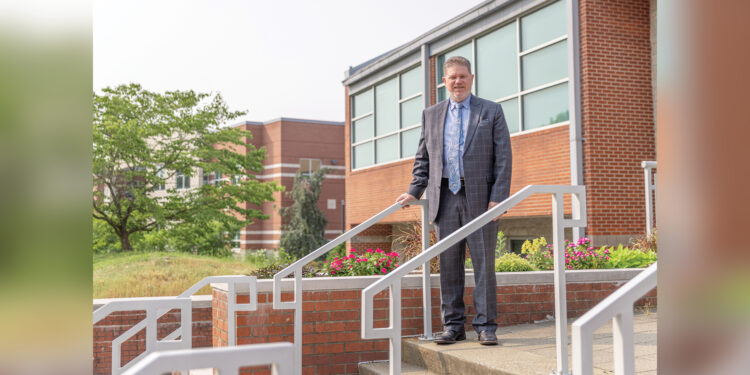Owensboro Community and Technical College
Photo by Jamie Plain
Scott Williams began his tenure as president of Owensboro Community and Technical College in 2015. His secondary education and career began at the University of Florida, where he earned his Bachelor’s and Master’s of Science in Animal Science.
Williams’ interest in animal science began with his family’s cattle farm in Union County, Kentucky. While he was born and raised in Lakeland, Florida, each summer he worked on the family farm in Morganfield, Kentucky.
Williams’ mother is from Morganfield and met his Florida-native father in college. They moved to Florida, but always remained close to his Kentucky family.
Williams completed his Ph.D. at Colorado State University and moved to Athens, Georgia to teach and conduct research at the University of Georgia for 10 years. It was there that he and his wife decided to return to Kentucky to have a cattle farm.
“I wasn’t even in Kentucky for a few months and I got a call from OCTC who heard I had moved and wanted to interview for an ag faculty position,” he said.
Williams took the position and served as the Agriculture Technology Program Director and the Biotechnology Program Coordinator, a program he developed.
In 2008, he became the Vice President for Academic Affairs and Chief Academic Officer, a position he held until becoming president.
In June, Williams celebrates eight years in this position.
“I never would have thought that,” Williams said. “I tried the administrative role and liked it.”
Williams tried cattle farming for a few years but has since sold the cattle and leased the farmland because it was just too much with his administrative roles.
Williams enjoys working with the faculty and staff at OCTC, as well as the whole community.
“We play a critical role, and our role is really that first step into higher education,” he said. “We are serving individuals and helping our students define their dreams and gain confidence.”
For some students, it is a starting point for a four-year college, but for others, it is about getting a better-paying technical job.
“We are a large part of our Owensboro workforce,” he said.
In the last 20 years, since the consolidation of Owensboro Community College and Owensboro Technical College, significant changes and shifts have occurred. Previously, classes were predominately geared toward receiving an associate’s degree before transferring to a four-year institution, but now, 50% of students are there for technical, skilled trades.
“It is becoming more mainstream,” Williams said of the acceptance of trade education. “We are fortunate that our community is at the forefront of dual credits [for high school students] and that schools, counselors and teachers see the seismic shift.”
This year, over 250 students graduated from area high schools with an associate’s degree, along with their high school diploma. Hundreds more graduated with college credit. Additionally, over 700 graduated from OCTC in the 2022-2023 school year.
Williams appreciates the opportunities provided by OCTC to meet these needs and said that hearing many students say they feel more comfortable when they move to a four-year institution is why they do it.
Other students finish their technology degrees after high school graduation.
“Both offer a significant savings for a college education,” Williams said of the dual credit program. “It is half the price of a four-year institution in the Commonwealth.
Williams said that the education world has changed significantly and there isn’t as much “chalk and talk” in the classrooms, but more project-based, student-led, electronic materials where students are actively learning.
“Faculty and instructors have learned to improve with technology,” he said, adding that OCTC and similar colleges see they are moving toward graduates with no secondary education but want to advance in their field.
“We are trying to provide the skills and degrees necessary for adult learners…those who get out [of high school], work, start a family and then go back to school,” he said. “We have to be more flexible on how we offer instruction.”
This includes the times that classes are offered and hybrid models that include online and in-person classes.
“There is a lot more flexibility and technology has helped with this, but somehow, we have to get time in person,” he said.
Williams believes augmented and virtual reality, mobile units that go where students are, and remote delivery will become part of the educational process in the near future.
“I am very proud of our team members here – our staff and students,” he said. “We came out of the pandemic stronger. Community colleges had declining enrollments, but we worked hard to focus on student success.”
In fact, this is the sixth straight summer for enrollment growth and the second year of growth in enrollment in the fall – over 500 students each time.










